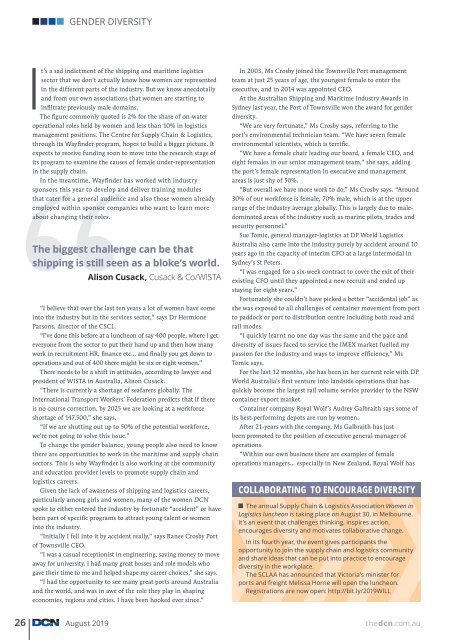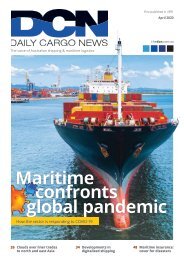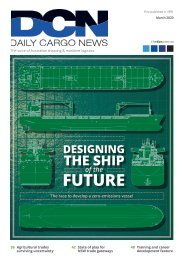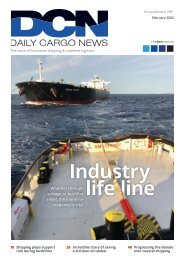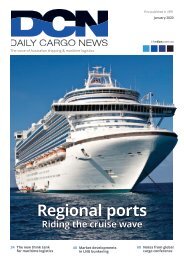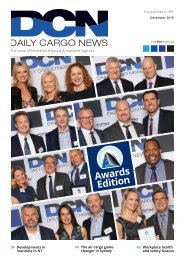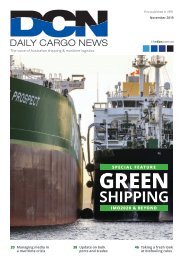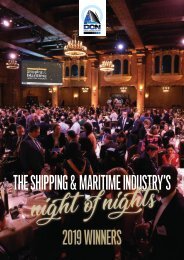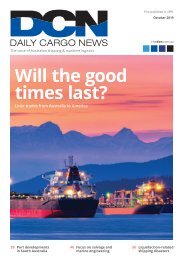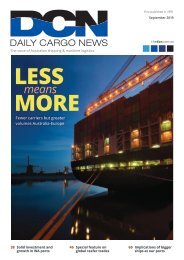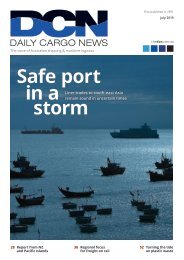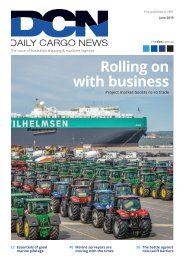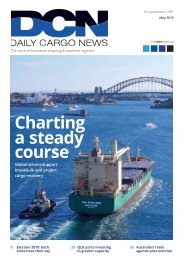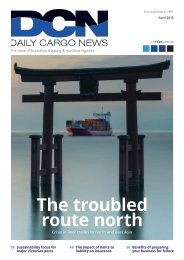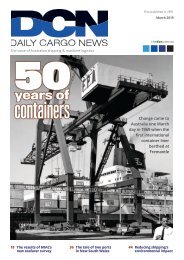DCN AUGUST Edition 2019
You also want an ePaper? Increase the reach of your titles
YUMPU automatically turns print PDFs into web optimized ePapers that Google loves.
GENDER DIVERSITY<br />
It’s a sad indictment of the shipping and maritime logistics<br />
sector that we don’t actually know how women are represented<br />
in the different parts of the industry. But we know anecdotally<br />
and from our own associations that women are starting to<br />
infiltrate previously male domains.<br />
The figure commonly quoted is 2% for the share of on-water<br />
operational roles held by women and less than 10% in logistics<br />
management positions. The Centre for Supply Chain & Logistics,<br />
through its Wayfinder program, hopes to build a bigger picture. It<br />
expects to receive funding soon to move into the research stage of<br />
its program to examine the causes of female under-representation<br />
in the supply chain.<br />
In the meantime, Wayfinder has worked with industry<br />
sponsors this year to develop and deliver training modules<br />
that cater for a general audience and also those women already<br />
employed within sponsor companies who want to learn more<br />
about changing their roles.<br />
The biggest challenge can be that<br />
shipping is still seen as a bloke’s world.<br />
Alison Cusack, Cusack & Co/WISTA<br />
“I believe that over the last ten years a lot of women have come<br />
into the industry but in the services sector,” says Dr Hermione<br />
Parsons, director of the CSCL.<br />
“I’ve done this before at a luncheon of say 400 people, where I get<br />
everyone from the sector to put their hand up and then how many<br />
work in recruitment HR, finance etc… and finally you get down to<br />
operations and out of 400 there might be six or eight women.”<br />
There needs to be a shift in attitudes, according to lawyer and<br />
president of WISTA in Australia, Alison Cusack.<br />
“There is currently a shortage of seafarers globally. The<br />
International Transport Workers’ Federation predicts that if there<br />
is no course correction, by 2025 we are looking at a workforce<br />
shortage of 147,500,” she says.<br />
“If we are shutting out up to 50% of the potential workforce,<br />
we’re not going to solve this issue.”<br />
To change the gender balance, young people also need to know<br />
there are opportunities to work in the maritime and supply chain<br />
sectors. This is why Wayfinder is also working at the community<br />
and education provider levels to promote supply chain and<br />
logistics careers.<br />
Given the lack of awareness of shipping and logistics careers,<br />
particularly among girls and women, many of the women <strong>DCN</strong><br />
spoke to either entered the industry by fortunate “accident” or have<br />
been part of specific programs to attract young talent or women<br />
into the industry.<br />
“Initially I fell into it by accident really,” says Ranee Crosby Port<br />
of Townsville CEO.<br />
“I was a casual receptionist in engineering, saving money to move<br />
away for university. I had many great bosses and role models who<br />
gave their time to me and helped shape my career choices,” she says.<br />
“I had the opportunity to see many great ports around Australia<br />
and the world, and was in awe of the role they play in shaping<br />
economies, regions and cities. I have been hooked ever since.”<br />
In 2003, Ms Crosby joined the Townsville Port management<br />
team at just 25 years of age, the youngest female to enter the<br />
executive, and in 2014 was appointed CEO.<br />
At the Australian Shipping and Maritime Industry Awards in<br />
Sydney last year, the Port of Townsville won the award for gender<br />
diversity.<br />
“We are very fortunate,” Ms Crosby says, referring to the<br />
port’s environmental technician team. “We have seven female<br />
environmental scientists, which is terrific.<br />
“We have a female chair leading our board, a female CEO, and<br />
eight females in our senior management team,” she says, adding<br />
the port’s female representation in executive and management<br />
areas is just shy of 50%.<br />
“But overall we have more work to do,” Ms Crosby says. “Around<br />
30% of our workforce is female, 70% male, which is at the upper<br />
range of the industry average globally. This is largely due to maledominated<br />
areas of the industry such as marine pilots, trades and<br />
security personnel.”<br />
Sue Tomic, general manager-logistics at DP World Logistics<br />
Australia also came into the industry purely by accident around 10<br />
years ago in the capacity of interim CFO at a large intermodal in<br />
Sydney’s St Peters.<br />
“I was engaged for a six-week contract to cover the exit of their<br />
existing CFO until they appointed a new recruit and ended up<br />
staying for eight years.”<br />
Fortunately she couldn’t have picked a better “accidental job” as<br />
she was exposed to all challenges of container movement from port<br />
to paddock or port to distribution centre including both road and<br />
rail modes.<br />
“I quickly learnt no one day was the same and the pace and<br />
diversity of issues faced to service the IMEX market fuelled my<br />
passion for the industry and ways to improve efficiency,” Ms<br />
Tomic says.<br />
For the last 12 months, she has been in her current role with DP<br />
World Australia’s first venture into landside operations that has<br />
quickly become the largest rail volume service provider to the NSW<br />
container export market.<br />
Container company Royal Wolf’s Audrey Galbraith says some of<br />
its best-performing depots are run by women.<br />
After 21-years with the company, Ms Galbraith has just<br />
been promoted to the position of executive general manager of<br />
operations.<br />
“Within our own business there are examples of female<br />
operations managers… especially in New Zealand. Royal Wolf has<br />
COLLABORATING TO ENCOURAGE DIVERSITY<br />
The annual Supply Chain & Logistics Association Women in<br />
Logistics luncheon is taking place on August 30, in Melbourne.<br />
It’s an event that challenges thinking, inspires action,<br />
encourages diversity and motivates collaborative change.<br />
In its fourth year, the event gives participants the<br />
opportunity to join the supply chain and logistics community<br />
and share ideas that can be put into practice to encourage<br />
diversity in the workplace.<br />
The SCLAA has announced that Victoria’s minister for<br />
ports and freight Melissa Horne will open the luncheon.<br />
Registrations are now open: http://bit.ly/<strong>2019</strong>WILL<br />
26 August <strong>2019</strong><br />
thedcn.com.au


